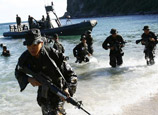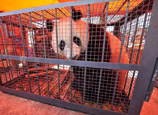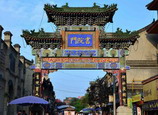
BEIJING, May 30 (Xinhua) -- The future of a Syria peace conference proposed by the United States and Russia appears to pivot on the Syrian opposition's demands that President Bashar al-Assad be excluded.
The Syrian National Coalition on Wednesday welcomed the plan to hold the peace conference in Geneva, Switzerland, but its spokeswoman Bayan Khatib said the coalition would only attend "if the international community commits to ensuring that al-Assad steps down."
The Syrian government has placed no pre-conditions on dialogue.
Syrian Foreign Minister Walid al-Moallem said Wednesday his government had not been invited to the conference but Damascus was ready for dialogue without pre-conditions.
He said the results of the Geneva conference would be put to popular referendum before being "literally" implemented, stressing al-Assad would remain in his post until the presidential elections in 2014.
The minister also slammed remarks from the opposition and their Western allies about the destiny of al-Assad and their desire for him to resign as a pre-condition for political settlement.
"President al-Assad is in contact with his people and the election in 2014 is in the hands of the Syrian people," al-Moallem said, adding "if the people in 2014 wanted al-Assad to run for the elections, he will do so."
Queried about whether the Geneva conference can be held in June, UN Secretary General leader Ban Ki-moon said Wednesday major world powers had not agreed on who would take part in the meeting.
As for who will represent the opposition, Ban said the largely divided opposition must go to any conference "in a coherent and unified manner."
"Therefore, I am not in a position at this time to tell you exactly when this will take place. But we are all committed to convening this meeting as soon as possible."
Meanwhile, Ban urged countries not to provide arms to either party in Syria, in response to the European Union's decision to lift a ban on supplying arms to Syrian rebel fighters.
The Syrian government condemned the EU decision, saying "they are hindering the international efforts aimed at achieving a political settlement to the crisis in Syria based on national dialogue among Syrians."
China also objected to the provision of weapons to any party in Syria as the use of force would only worsen the situation in Syria and intensify the suffering of the Syrians.
Chinese envoy to the Middle East Wu Sike said Wednesday China opposed any external intervention in Syria and "dialogue is the best way to end the conflict."
The 26-month-long crisis in Syria has claimed more than 70,000 lives and displaced millions of people to neighboring countries, according to recent UN statistics.
On Wednesday, the Syrian army regained full control of a military base in the strategic al-Qussair city in central Syria and dislodged rebels from towns near Damascus, according to the state-run SANA news agency.
Meanwhile, SANA said the army also managed to retake the rebel-held villages of al-Duwair and Mhajrin in the northern part of Homs province.
Salim Harba, a Syrian military expert, told the pan-Arab al-Mayadeen TV that more than 40,000 foreign fighters were currently fighting alongside rebels across Syria.
In an interview with al-Mayadeen, Syrian Foreign Minister al-Moallem complained that more than 28 countries had helped radical Jihadists enter Syria via Turkey.
The army's recent advancement is seen by political experts as the Syrian authority's attempt to strengthen its position ahead of the pending peace conference in Geneva.
















 A 62-year-old man was killed by two dogs
A 62-year-old man was killed by two dogs


![]()
